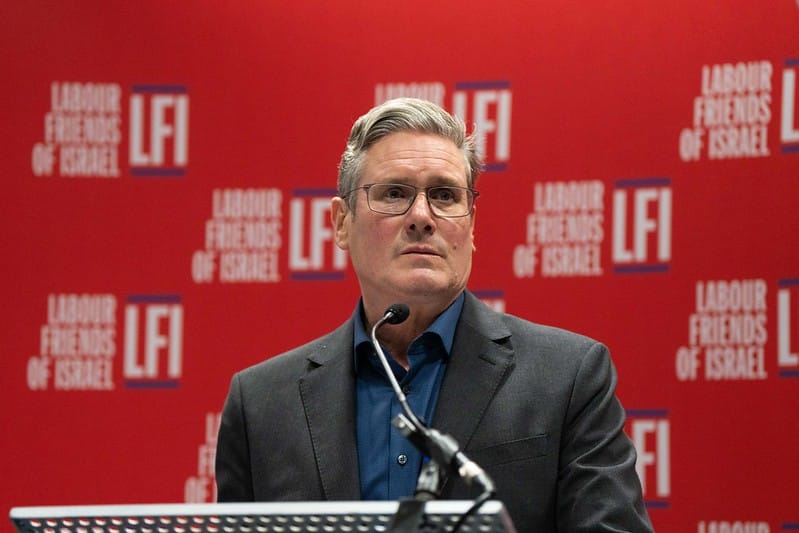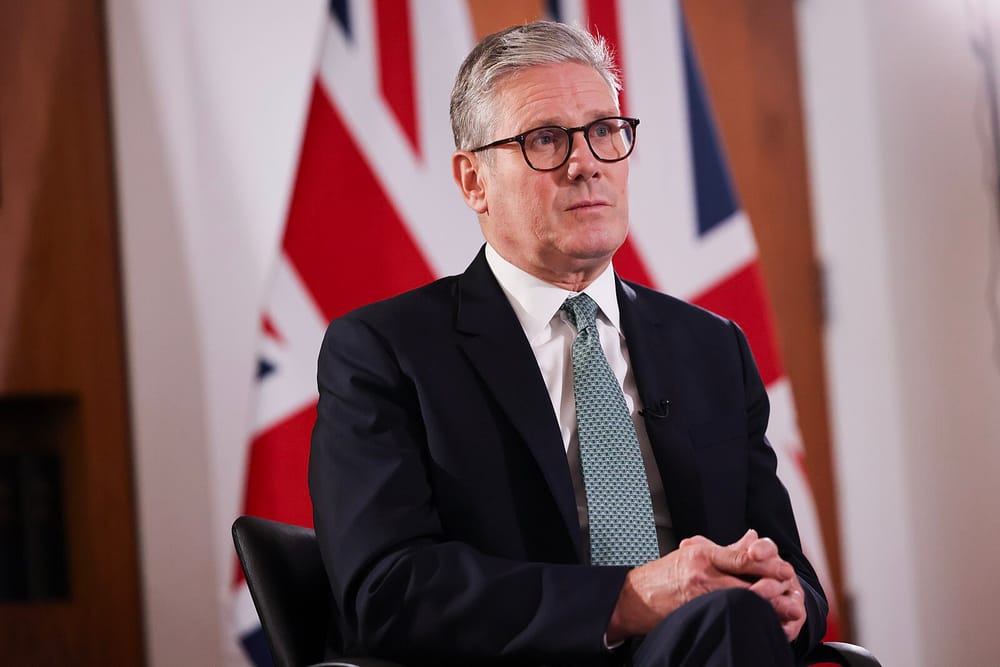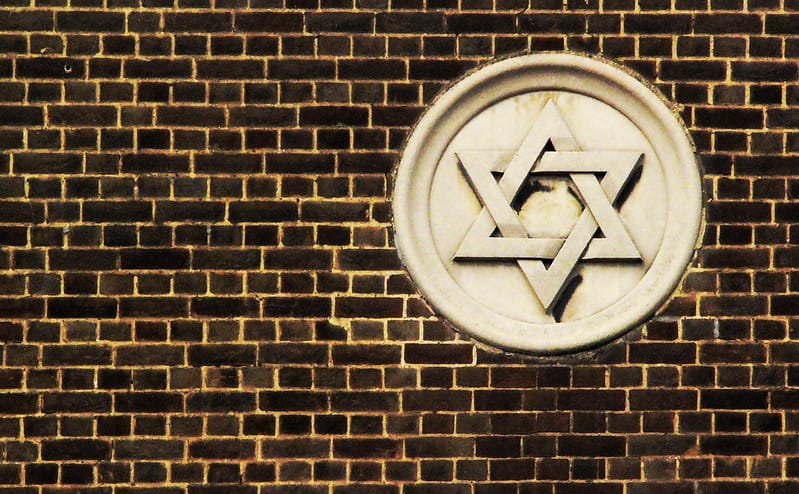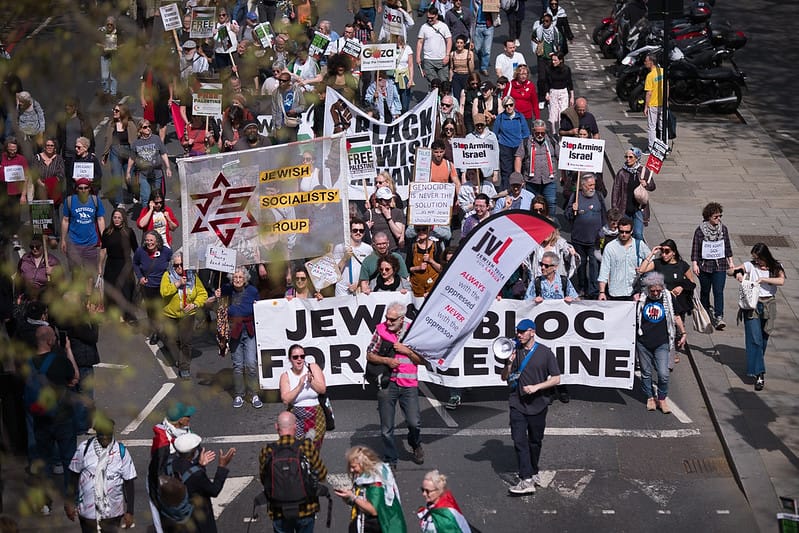
In January 2025, The Runnymede Trust published Facing antisemitism: the struggle for safety and solidarity, a new report on antisemitism in the UK by Professor David Feldman, Dr Ben Gidley, and Dr Brendan McGeever of the Birkbeck Institute for the Study of Antisemitism.
Situated in a post-7 October 2023 context, the report argues that “antisemitism is deeply embedded into our common culture…as a reservoir of racist stereotypes and narratives about Jewish people, which are normalised and widespread.” Through this analytical lens, the authors examine the manifestations of antisemitism today and engage the politics of anti-antisemitism as practiced by the Jewish community, the state, and the left.
The report concludes that the current approach to combating antisemitism in the UK is not working. The authors call for the UK government and wider anti-racist organisations to “move beyond framing and discussing antisemitism in ways that pit communities against one another, prohibit solidarity and encourage division” and to adopt a “360-degree antiracism” that develops alliances between Jewish people and other racialised minorities.
Professor Feldman, Dr Gidley, and Dr McGeever recently spoke to Vashti about Facing antisemitism. In a wide-ranging interview, the authors discuss the framing of their report, the concept of “the reservoir of antisemitism”, and address possible points of contention in their analysis of the relationship between Zionism and anti-racism.
Interview by Matthew Gordon.
You can read Eli Machover’s response to this interview here.
Your report takes October 7th as a starting point to reinvigorate a discussion of how we understand antisemitism and other forms of racism in Britain. Yet, in the report, you also stress that, while many people within and outside the Jewish community see the current moment as a watershed, previous flashpoints in Israel/Palestine have seen similar temporary spikes in racism towards Jews. What led you to frame it in this way?
David Feldman (DF): The 7th of October was a watershed in some important respects. Obviously, if you see it from inside of Israel, there was something unprecedented about what happened on that day. But insofar as it relates to the experience of Jewish people outside of Israel, especially to Jewish people in the UK, and in the US as well, the impact is less clear cut. First, if we look at recorded antisemitic incidents, for example, there's been a marked spike since October 7th. But this is less new than it is a turbo-charged repetition of earlier trends when there has been violence in Israel/Palestine.
Second, our report addresses the distance that has emerged between opposing antisemitism and the politics of anti-racism. I argue elsewhere that this distance came into shape more than two decades ago, after the UN conference against racism held at Durban in 2001, which led to a revival of the charge that Zionism is racism and that Israel is an apartheid state engaging in ethnic cleansing. This was also the time of the Second Intifada. Feeling the strain of these ideological and armed attacks, Israel and its supporters in the Jewish diaspora began to formulate new definitions of antisemitism which tied conceptions of antisemitism to anti-Zionism and severe criticism of Israel. One can draw a line - perhaps not a straight line, but a crooked one - between the events of 2001 and the advent of the IHRA working definition on antisemitism in 2016; between the events of 2001 and the distance between the politics of anti-antisemitism and the politics of anti-racism that our report addresses.
The discourse around antisemitism in Britain has exhibited what could only be called a fixation with the left, despite its lack of political power. At the same time, we see far-right governments throughout the West rising to power on the backs of explicit xenophobic and racist platforms, who present clear and present dangers to the safety of Jews and other racialised minorities. How does your report deal with the perceptions and realities of Left and Right on the issue of antisemitism in Britain?
Brendan McGeever (BM): The report states that antisemitism does not exclusively belong to either the right or the left. Beyond this, however, it says little about the sources of antisemitism. This is because the report has a different aim, which is to offer a critical assessment of the politics of state-led ‘anti-antisemitism’ – activity by the state designed to combat antisemitism. We felt this was an important, indeed urgent, contribution to make because state responses to antisemitism encapsulate several key issues that define current debate, such as the relationship between (indeed conflation of) anti-Zionism and antisemitism, and the divergence between anti-racism and opposition to antisemitism.
Ben Gidley (BG): Current debate is also framed by the sensational reporting of statistics about unprecedented levels of antisemitism, for example about the number of incidents or about how many people hold negative attitudes to Jews. Yet rarely do we get a critical and holistic account of how those data sets are collected, interpreted and acted upon, and how they relate to each other. So we wanted to focus not so much on the sources of antisemitism but rather its manifestations - how political debates and assumptions about what counts shape the way antisemitism is measured, as well what the datasets tell us about the complexity of contemporary antisemitism when we consider all of its different manifestations together.
What has the British state’s particular approach to anti-antisemitism been, and how has the mainstream Jewish community responded to that approach?
BM: One of the defining features of state-led opposition to antisemitism has been the close cooperation of the Jewish communal mainstream. In other words, the dominant approach of the Jewish mainstream has been to seek vertical alliances in the form of state protection against antisemitism.
While this may make many Jewish people feel safe in the short term, we think this is a flawed strategy for three reasons. First, both the state and the Jewish communal mainstream tend to conceive of antisemitism as a form of personal prejudice. Antisemitism, understood in this way, is a problem of bad ideas. This leads to a fixation on individual antisemites not the wider reservoir of antisemitism that is embedded in our society. Second, this understanding of antisemitism as the product of individual prejudice leaves us unable to comprehend the structural forms of racism in which the state is directly complicit. This includes, for example, Islamophobic policies that target British Muslims and contribute to racist outcomes such as unequal access to housing and health. Third, when the state and political parties put significant energy into combating antisemitic ideas but fail to act with similar force against Islamophobia or structural racism, it confirms the perception of a hierarchy of racism. This gives life to a competitive victimhood that further pulls apart the horizontal alliances and broad coalitions required to confront all racisms, including antisemitism.
Your report draws from the concept of the “reservoir of antisemitism” as a common pool of tropes, narratives and images deployed by different actors, with different political agendas at different historical moments, to stoke anti-Jewish hatred. Joseph Finlay’s piece in Vashti takes issue with the reservoir concept, seeing it as prioritising attitudes over both material threat and social relations, and thus potentially glossing over historical and geographic differences in the nature and severity of hatred towards Jews. What would you say to this?
BG: We agree that the mainstream account of antisemitism is problematic, for example in its portrayal of a timeless and eternal form of hatred. This is why, in the report, we make clear that the reservoir of antisemitism is not eternally unchanging but continuously renewed. Some elements of the reservoir slip away with time, while new elements appear. We also strongly make the point that antisemitism should not be reduced to discourse. We argue that the reservoir of antisemitism has a material impact on lives: antisemitism should be thought of in terms of institutional and structural elements and not just as hostile attitudes, prejudices or bad ideas.
Do you see what you're offering as a set of shared principles, goals or reference points that all different parts of the Jewish community could get behind? Or, is there a sense that polarisation within the Jewish community both across political parties and over the issue of Israel rules out any common ground on either anti-antisemitism or anti-racism?
DF: I don't think we offer something which all Jews in Britain will latch onto, and that's because the Jewish population in Britain is increasingly polarised. Opposition to racism in this country and the sense of affiliation to Israel – which the majority of the Jews in the UK feel – produces a contradiction. This contradiction is created by, on one side, opposition to racism when it is directed at Jews in this country and, on the other, the reality of Israel’s discrimination against Palestinians since its creation in 1948 and the intensification of that in recent years.
This contradiction has been contained for a long time, but for many Jewish people, it's becoming harder to bear. Increasingly, it forces British Jews to make choices over whether they privilege their support for the current regime in Israel or a thoroughgoing anti-racist politics in the UK. There are many different responses to this and there are some who, in good faith, want to argue for a consistent anti-racism in both the UK and Israel. However, the evidence shows that growing numbers of Jewish people are making a choice one way or the other.
BM: The current moment seems to be characterized by two concurrent developments: on the one hand a hardening of views and an entrenchment of polarization, yet on the other there is a breaking apart of a longstanding consensus, the most striking manifestation of which is the emergence of a minority section of the community, especially among younger generations, from which a different politics is being articulated, one that is at odds with the mainstream.
Basic preconditions for consensus would seem to involve mutual respect, care and kinship; a sense of trust in the other side that, whatever our differences, we are committed to each other’s well-being. With that in mind, when the Jewish left sees mainstream institutions like the Anti-Defamation League (ADL) lining up to justify and excuse Elon Musk performing a Nazi salute, thus seemingly putting political alliances above the safety of the Jewish community, from where can such trust and respect emerge?
DF: What is so striking [in the Musk case] is the way in which the ADL were so selective with their generosity [i.e., in their good-faith interpretation of his intentions]. More broadly, there is a growing disconnect between mainstream Jewish communal organisations and large parts of the population they claim to represent. This is underpinned by the long term growth of a minority view which is broadly speaking, non- and anti-zionist and which now comprises a little under 30 per cent of the adult Jewish population. The politics of the Jewish population is more diverse, and more divided than at any other time since 1945. In this country, community leaders are being desperately slow to acknowledge this fact and adjust their policies, claims and public rhetoric accordingly.
In the report, we end on a tentatively optimistic note. We can see a constituency for a politics that's consistently anti-racist, in Israel/Palestine and in the UK. But we also note that the challenge is how more of the Jewish population can be brought along on this path. The report is a call for a new coalition.
Is bringing mainstream Jewish institutional figures on-side a necessary precondition for the type of movement you envision? Because, for most of us on the Jewish left, these communal institutions have lost a lot of legitimacy, and are in fact the primary obstacle to political change.
BM: We hope that the report reaches a wide readership, in particular those who are looking for a different way of thinking about and combatting antisemitism. If mainstream institutional figures change direction, adopt a critical stance on state racism and form the sorts of alliances that we are calling for, then great. However, we are not holding our breath; the evidence of the last years does not suggest that this is going to happen. On the contrary, last October the Board of Deputies and the Campaign Against Antisemitism reached an agreement to work more closely together, which suggests that the main communal leadership is preparing to move in the other direction. This leaves unanswered the question who will speak for the near 30% of British Jews who today do not identify with Zionism.
Coming to that, when even something as fundamental as safety is granted on the basis of one’s political leanings, then how will leftwing Jews ever trust those claiming to represent them on the national stage?
BM: Safety is one of the watchwords of the report – it's even in the title. It's understandable that many Jews turn to the state when the state says loudly, “we will protect you, we will fight antisemitism.” It's little surprise that in a period where the left has been defeated for many decades, where anti-racist movements on the whole have been in retreat, many turn to the state for protection. But safety is not something that is distributed evenly: state anti-antisemitism has routinely racialised other minority populations – particularly British Muslims – in the name of protecting Jews. This is deeply troubling and problematic. In shining a light on this we hope the report reaches those Jews who, feeling fear and apprehension about the current moment, are open to a different way of confronting the actuality of antisemitism, one that does not racialise and stigmatize other minorities in the name of Jewish safety.
Part of the tension, or confusion, seems to stem from an ambiguity within the status and place of antisemitism, which simultaneously claims to be singular and unique, while at the same time also part of a universal struggle against racism of all kinds. How can we reconcile these particularising and universalising imperatives?
DF: Unique in this context is often used ambiguously, because in a sense every historical process is unique. But people use the word unique in the context of antisemitism to mean that it's worse than anything else that has ever been, something which expresses the unhelpful dynamic of competitive victimhood.
At the same time, thinking about the specifics of antisemitism is important and can contribute. For instance, approaching racism through the lens of antisemitism directs us to thinking about a form of racism which predates colonialism and predates enslavement. Jewish people are not the only group to have experienced racialisation outside of these frameworks. Most obviously, one thinks of Roma and Sinti in Europe. Thinking about antisemitism distinctively not only helps us to think about the predicament of Jews in the present and over time, but it can also help us build a better anti-racism.
Second, some of the problems we encounter with anti-antisemitism also highlight wider tensions and issues in anti-racist politics. When some Jewish people identify anti-Zionism as antisemitism they do so on the basis of their identity and their lived experience as Jews. And when they do this they are adopting and using a political vocabulary that they've learned from the left and from the anti-racist movement, where the centring of lived experience is an orthodoxy. Of course, many anti-racists will have no sympathy for this identification of anti-Zionism as a sort of anti-Jewish racism. But to my mind this should push us to raise critical and difficult questions about the sovereign status many radicals give to lived experience when they name oppression.
BM: The question of universality and particularity brings us again to the state. One of the key features of the current conjuncture, as I noted already, is that Jews seek and find protection in the arms of the state. Yet, when placed in a more universal and historical frame, we can see that the state has always racialized particular minorities at different moments. At times, it has been Jews; in other moments in British history, it was Irish Catholics. The state may no longer actively and structurally discriminate against Jews, as it did in the late 19th and early 20th century, but it is still actively racialising and discriminating against other communities. A key feature of our current situation is that the politics of anti-antisemitism are now entangled with those racialising state practices.
Our report calls for an anti-racist politics predicated on horizontal alliances. To genuinely confront antisemitism, then, it needs to be integrated into a wider confrontation with racism, and this means at some point or other we will have to come to terms with the state and state racism. Building these alliances will not be easy, and will require difficult conversations about Palestine, Zionism and the future of the anti-racist project. Our report is only a contribution to these new conversations among Jewish and non-Jewish radicals, not its terminus.
Zionism, as a political project, has elements that are generally understood to fundamentally conflict with an anti-racist stance, such as the idea of ethnic supremacy within a given territory. Yet, in your report, one gets the impression that a more humane and liberal Zionism would be sufficient to bridge the gap between the anti-antisemitism movement and the rest of the antiracism movement. What would you say to those, particularly on the anti-Zionist left, who disavow Zionism precisely because they see it as incompatible with 360 degree anti-racism?
BG: I suspect each of us would answer this a little differently, but I’ll have a go. I’d begin by asking how high a bar should the anti-racist movement be setting as a purity test for its coalition, especially at a time when racism and fascism are something of an emergency and the need for an anti-racist coalition is urgent. The two thirds of British Jews who identify as Zionists mean a whole host of things when they call themselves that, from enthusiastic support for genocide and apartheid, to binationalism and opposition to occupation. Some of those positions will always be fundamentally opposed to any kind of anti-racism; others less so.
We agree there’s a lot of work to be done to educate and persuade the Zionist mainstream about the exclusionary and oppressive relationship of Israel to Palestinians since its foundation. But, historically, Zionists played a part in fighting British fascism, for example. Reg Freeson, one of the most Zionist Labour MPs, at a Holocaust memorial meeting in 1967 told his audience that ‘when a fascist thug hits a coloured man he hits a Jew.’ And the legacy of that, the memory of Cable Street, is not completely dead in the mainstream community. Horizontal solidarity isn’t an easy project: it’s easy to be in alliance with people who are on exactly the same page as you, but resisting racism demands something harder.▼
To donate once or monthly, click here.
Author

This article was produced by the editorial collective at Vashti.
Sign up for The Pickle and New, From Vashti.
Stay up to date with Vashti.



